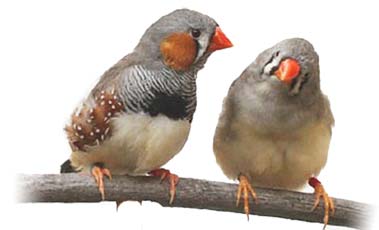Finches
The Zebra finch originates from Australia, but the Bengalese finch is not seen in the wild as it is a product of many years of selected captive breeding. Zebra and Bengalese finches naturally live in flocks and should not be kept singly. Either keep them in pairs in cages or in small groups in aviaries. Zebra and Bengalese finches can be kept with canaries. Properly cared for, your finch will live for several years.
CHOOSING AND BUYING YOUR FINCH
A healthy finch should be:
Bright and alert
Have no signs of discharge from the eyes or nostrils
Have a clean vent area
Feathers should be flush to the body and not be fluffed up
Should have no signs of breathing problems
Movement should be fluent with no signs of lethargy
Have no signs of discharge from the eyes or nostrils
Have a clean vent area
Feathers should be flush to the body and not be fluffed up
Should have no signs of breathing problems
Movement should be fluent with no signs of lethargy
HOUSING
Bengalese and Zebra finches can be housed in a cage or in an aviary. A roomy cage is advisable and should be large enough for your finches to stretch their wings and fly from perch to perch. You should avoid putting the cage in draughts, direct sunlight or in damp or humid conditions. Sand sheets or cage bird sand should be placed in the bottom of the cage and replaced regularly. The cage should be furnished with perches of different diameter and one or two toys, but do not overcrowd the cage. Try and buy a selection of toys and rotate them to avoid boredom. Remove droppings daily. The cage and furnishings should be thoroughly cleaned and disinfected with a pet-safe disinfectant weekly. A removable tray will make cleaning easier. Care should be taken not to disturb your finch at night. Night fright can cause the birds to fly into the cage wire, so be sure to cover the cage at night. Bengalese and Zebra finches are keen bathers and shallow dishes should be provided. Outside aviaries must have a sheltered section to provide protection from wind, rain and strong sunlight. This is where you should position the roosting site (the highest perch or nest box) and the food containers.
Aviaries should be suitably furnished with branches of different widths. Do not place perches directly above food and water pots. Introducing your finch to his new home Before introducing your finches to their new home fill the food and water pots and sprinkle a little extra onto the floor to ensure that they have enough to eat until they find the seed pots. Make sure all windows and doors are closed and fires are guarded. Gently open one end of the carry box and let your finches walk into their new home. If they appear anxious or do not settle, drape a cloth over three sides of the cage until they settle. This can be gradually removed as they settle down. Leave them to adjust quietly.
Aviaries should be suitably furnished with branches of different widths. Do not place perches directly above food and water pots. Introducing your finch to his new home Before introducing your finches to their new home fill the food and water pots and sprinkle a little extra onto the floor to ensure that they have enough to eat until they find the seed pots. Make sure all windows and doors are closed and fires are guarded. Gently open one end of the carry box and let your finches walk into their new home. If they appear anxious or do not settle, drape a cloth over three sides of the cage until they settle. This can be gradually removed as they settle down. Leave them to adjust quietly.
FEEDING AND WATER
A good quality finch mixture should be available from your pet shop. Check the seed dishes daily and remove any empty husks. Refill as necessary. Thoroughly washed, fresh green food may be given, such as lettuce, chick-weed and dandelion and sweet apple. Be careful not to overfeed. Cuttlefish is a source of calcium and helps to keep the beak worn down. A mineral block will provide essential minerals and trace elements. Grit helps with the digestion and should always be provided. Food and water pots should be washed regularly. Fresh water should always be available.
GENERAL CARE
Properly cared for your finch will live a long and happy life.
Colds – Chilling causes colds. The bird will be listless, with feathers fluffed up and wheezing. Keep him warm and do not bath. Consult with your vet.
Diarrhoea – This is commonly caused by an excess of green food, mouldy or contaminated food, a change in diet or lack of fresh water. Keep him warm, make sure he has plenty of fresh water and consult your vet.
Mites – Usually the red mite, this is a parasite which feeds on birds blood, causing itching and weight loss. Mites are easy to destroy with a suitable spray, your pet shop or vet will advise.
Toenails – Overgrown claws need to be clipped. If left they will endanger the bird by becoming caught in the cage wire. Care must be taken when cutting nails to avoid cutting the blood vessels and nerves. Consult your vet or pet shop.

Shopping List
- Cage and cage stand
- Mineral block
- Water pot
- Cage cover
- Perches
- Seed pot
- Bath
- Seed guard
- Toys
- Food
- Grit Sand/ sand sheets
- Cuttle fish
- Pet-safe disinfectant
- Book on finch care
